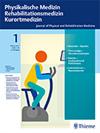基于磁共振成像特征的脑卒中后肩关节疼痛发病机制的回顾性研究
IF 0.5
4区 医学
Q4 REHABILITATION
Physikalische Medizin Rehabilitationsmedizin Kurortmedizin
Pub Date : 2022-11-30
DOI:10.1055/a-2147-0259
引用次数: 0
摘要
摘要背景脑卒中后肩痛(PSSP)发病率高,但其具体发病机制尚不清楚。因此,这一领域还需要进一步的研究。目的回顾PSSP患者肩关节的磁共振成像(MRI)特征,探讨其发病机制。方法选取2017年6月至2021年8月南京医科大学第二附属医院康复医学科(住院和门诊)接受MRI检查的74例PSSP患者。本研究对患者的MRI特征进行梳理和总结,分析年龄、性别、偏瘫侧、脑卒中类型、发病时间的MRI表现差异。结果通过对所有PSSP患者MRI特征的检查,发现56例(75.67%)有棘上肌腱损伤,11例(14.86%)有棘下肌腱损伤,24例(32.43%)有肩胛下肌腱损伤,2例(2.7%)有圆肌小肌腱损伤,60例(81.08%)有肱二头肌长头肌腱鞘积液(炎症),23例(31.08%)有肱骨头骨髓水肿,64例(86.49%)有肩关节囊积液。肩峰降囊积液6例(8.11%),喙突降囊积液11例(14.86%),滑膜增厚8例(10.81%),骨化性肌炎1例(1.35%)。结论不同性别和偏瘫侧的MRI表现差异无统计学意义,结果显示老年组冈上肌腱损伤明显多于年轻组(P=0.039)。冈上肌腱损伤及肱二头肌长头肌腱鞘积液(炎症)患者脑梗死发生率高于脑出血患者(P=0.002, P=0.028)。根据发病时间分为1个月以内组、1 - 3个月组和3个月以上组。结果显示,三组患者肱骨头骨髓水肿及肩关节囊积液数差异均有统计学意义(P=0.049, P=0.002)。本研究结果有助于提高临床诊断和治疗PSSP的准确性,提出更合理的治疗方案。本文章由计算机程序翻译,如有差异,请以英文原文为准。
Study On The Pathogenesis Of Post-Stroke Shoulder Pain Based On The Characteristics Of Magnetic Resonance Imaging-A Retrospective Study
Abstract Background High morbidity has been proved frequently happened in post-stroke shoulder pain (PSSP), but the specific pathogenesis of PSSP still remains unclear. Therefore, further research needs to be done to investigate this field. Objective The aim of this study which reviewed the features of magnetic resonance imaging (MRI) on shoulder joint of patients with PSSP, is to find the consequence of pathogenesis. Methods This study starts from June 2017 to August 2021, 74 PSSP patients who accepted MRI examination were selected in the Department of rehabilitation medicine of the Second Affiliated Hospital of Nanjing Medical University (inpatient and outpatient). This study sorted out and summarized patients’ MRI characteristics, analyzing differences of MRI appearance according to age, gender, hemiplegic side, stroke type and onset time. Results After examining all PSSP patients’ MRI characteristics, this study found 56 (75.67%) had supraspinatus tendon injury, 11 (14.86%) infraspinatus tendon injury, 24 (32.43%) subscapular tendon injury, 2 (2.7%) teres minor tendon injury, 60 (81.08%) tendon sheath effusion (inflammation) of long head of biceps brachii, 23 (31.08%) humeral head bone marrow edema and 64 (86.49%) shoulder joint capsule effusion. Moreover, there were 6 cases of acromial descending sac effusion (8.11%), 11 cases of coracoid descending sac effusion (14.86%), 8 cases of synovial thickening (10.81%), and 1 case of ossifying myositis (1.35%). Conclusion No significant differences were found in MRI features according to gender and hemiplegic side .The results showed the injury of supraspinatus tendon significantly increased in the older group compared to the younger group (P=0.039).The patients with supraspinatus tendon injury and tendon sheath effusion (inflammation) of long head of biceps brachii have higher cerebral infarction than patients with cerebral hemorrhage (P=0.002, P=0.028). Based on the time of onset, the participants were divided into three groups: within 1 month, 1–3 months and more than 3 months. The results suggested significant differences in humeral head bone marrow edema and shoulder joint capsule effusion numbers among the three groups (P=0.049, P=0.002). The results of this research could help to improve the accuracy of clinical diagnosis and treatment of PSSP, putting forward a more reasonable treatment scheme.
求助全文
通过发布文献求助,成功后即可免费获取论文全文。
去求助
来源期刊
CiteScore
1.10
自引率
25.00%
发文量
70
审稿时长
3 months
期刊介绍:
The Journal of Physical and Rehabilitation Medicine offers you the most up-to-date information about physical medicine in clinic and practice, as well as interdisciplinary information about rehabilitation medicine and spa medicine.
Publishing 6 issues a year, the journal includes selected original research articles and reviews as well as guidelines and summaries of the latest research findings. The journal also publishes society news and editorial material. “Online first” publication ensures rapid dissemination of knowledge.

 求助内容:
求助内容: 应助结果提醒方式:
应助结果提醒方式:


